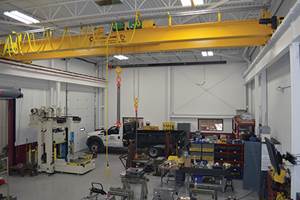Statistics Uphold Mexico’s Importance in Plastics Industry
Did you know that Mexico is the world’s second largest importer of molds and tools?
Did you know that Mexico is the world’s second largest importer of molds and tools? It is, according to statistics shared by Asociación Nacional de Industrias del Plástico (Anipac), a trade organization that says it is the “voice of the plastics industry in Mexico.” In addition, Anipac says Mexico enjoys the following, additional rankings:
- Capital Good investments exceeded $2.7 billion in 2016, which highlights a trend of updating and upgrading production capacity inside plastic companies that have operations there.
- Mexico is the third largest importer of capital goods for the plastics industry globally and the fourth largest in machinery imports.
- In 2016: production grew a notable 5.7 percent, consumption grew 5.5 percent and plastics exports exceeded 1.9 million tons, which represents 34 percent of the volume produced.
- The market value of the plastics industry in Mexico exceeded $26 billion in 2016, despite imports remaining very high.
- Mexico is ranked 11th globally in plastics production and eighth in plastics consumption (26 kg of plastics consumption per capita/year)
- Mexico’s plastics industry employs approximately 220,000 people.
What’s driving these growth figures? Anipac says significant momentum has been gained mainly in automotive parts but also in industrial parts, spurred by an evolution in the automotive, electronics and aerospace industries. Because of OEMs like BMW, Audi, Mercedes and Volkswagen, Mexico has seen new molding facilities opening to better accommodate growing OEM demand, and Anipac says it is in plastics machinery that the greatest volume of new technology investments is happening. With new molding facilities comes greater demand for mold manufacturing and related businesses.
These statistics are further supported by news releases MMT is receiving. For instance, MGS Mfg. Group Inc. recently announced that it acquired a 125,000-square-foot injection molding facility in, Juárez, Mexico, from Jabil Inc. The plant has 65 injection molding machines and 500 employees who manufacture plastic parts for automotive, electronics and consumer products, just as MGS’s molding plant in Chihuahua, Mexico, does. MGS says it first entered the Mexico market in 2008, and business at the Chihuahua plant has grown 10 percent annually over the last four years, spurring the company’s investment in more capacity to continue serving OEMs, brand owners and Fortune 500 companies. Still, there is an ongoing climate of uncertainty over renegotiation of NAFTA, but Paul Manley, MGS president, said, “While there's uncertainty, when we look at our customers continuing to invest in Mexico and localize manufacturing from Asia to Mexico to service the North American market, we see a strong manufacturing relationship between Mexico and the United States at the moment, and we must make decisions for our business based upon what we know today." Before the Juárez acquisition, most of MGS's sales, about 45 percent, came from the health care market, which isn't served by either facility in Mexico. The company also does substantial work in markets for electronics (22 percent), automotive (18 percent) and consumer products (8 percent). "While health care has been our fastest growing market," Manley said, "we see value in the diversification of the markets we serve."
I heard similar rationale from other companies based in the U.S. and Canada when I wrote my recent feature titled “Mexico: Manufacturing Mecca to the South.” Moldmaking companies I interviewed told me that opportunities in Mexico are increasing, and supply-chain businesses like Ellwood Specialty Steel, DME/Milacron, Mold-Masters / Milacron and Gesswein & Company are opening new facilities there to serve the growing needs of the plastics industry.
Anipac says challenges faced by companies operating in Mexico include keeping up with technology, access to high-quality products at an affordable price, production efficiency and training, among others. Again, I find this to be true based on what I learned when writing my October feature. In fact, even Mexico-based mold manufacturers are having trouble finding, training and retaining good employees. It seems to be a North American problem and not just a U.S. and Canada issue.
MMT will continue to monitor the mold and tooling market in Mexico, as it certainly shows signs of growth and opportunity.
Related Content
Think Safety: Eliminate Hazards Throughout the Shop
The tooling community is taking advantage of new products for safer mold shops and molding facilities.
Read MoreThe Role of Social Media in Manufacturing
Charles Daniels CFO of Wepco Plastics shares insights on the role of social media in manufacturing, how to improve the “business” side of a small mold shop and continually developing culture.
Read MoreThe Trifecta of Competitive Toolmaking
Process, technology and people form the foundations of the business philosophy in place at Eifel Mold & Engineering.
Read MoreMMT Chats: Solving Schedule and Capacity Challenges With ERP
For this MMT Chat, my guests hail from Omega Tool of Menomonee Falls, Wisconsin, who share their journey with using enterprise resource planning (ERP)—and their people—to solve their schedule and capacity load monitoring challenges.
Read MoreRead Next
How to Use Continuing Education to Remain Competitive in Moldmaking
Continued training helps moldmakers make tooling decisions and properly use the latest cutting tool to efficiently machine high-quality molds.
Read MoreReasons to Use Fiber Lasers for Mold Cleaning
Fiber lasers offer a simplicity, speed, control and portability, minimizing mold cleaning risks.
Read MoreAre You a Moldmaker Considering 3D Printing? Consider the 3D Printing Workshop at NPE2024
Presentations will cover 3D printing for mold tooling, material innovation, product development, bridge production and full-scale, high-volume additive manufacturing.
Read More




















